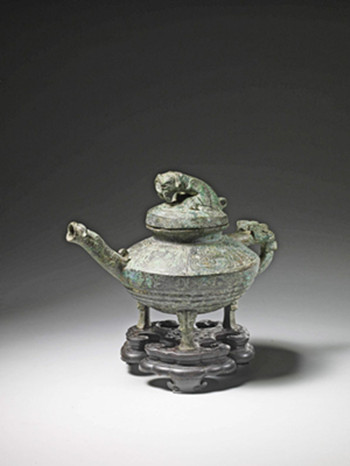
A bronze water vessel, known as Tiger Ying, is up for auction in Kent. (The Canterbury Auction Galleries/For China Daily)
Big price expected for incredibly rare item
A rare Chinese bronze water vessel believed to have been taken during the looting of Beijing's Old Summer Palace in 1860 has been discovered in Kent, southeast England.
The relic will go on sale at The Canterbury Auction Galleries on April 11 with an estimate of 120,000 to 200,000 pounds ($170,000 - $285,000).
According to The Canterbury Auction Galleries, only six similar archaic vessels, known as Ying, are said to exist, and five of them are in museums.
The vessel dates back to the Western Zhou dynasty (1027-771 BC). It is called the Tiger Ying because the spout and lid are both cast with models of the creature.
Three other later Qing Dynasty bronze works of art were also found by the saleroom's consultant in Chinese art, Alastair Gibson.
"When I was asked to view a small collection of Chinese bronzes in this unassuming house, I didn't imagine the door would open to an 1860s time capsule," he said. "The last thing I expected to find was this remarkable bronze."
Gibson said that there is nothing else comparable to the Tiger Ying in today's market.
"Only one Ying has ever been offered at auction before and none of the five others known is modelled with what in Chinese art is considered the king among beasts and the most powerful animal for warding off evil," Gibson added.
A thermoluminescence test on the pottery core of the handle and one foot was done in Oxford, determining the age of the bronze vessel to be between 2,200 and 3,500 years old.
The Summer Palace was looted and destroyed by British and French troops during the Second Opium War between 1856-60.
Also found was an archive of letters and photographs from Royal Marines Captain Harry Lewis Evans (1831-83), who fought in the war, gives a vivid account of his time in China.
Before arriving in Beijing, Evans had taken part in the capture of Canton in 1857 and was slightly wounded in the failed attack on the Taku Forts at the mouth of the Pei-ho River in 1859.


















































